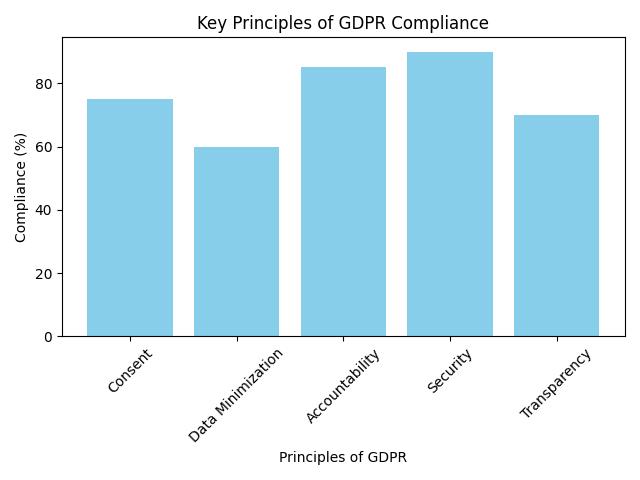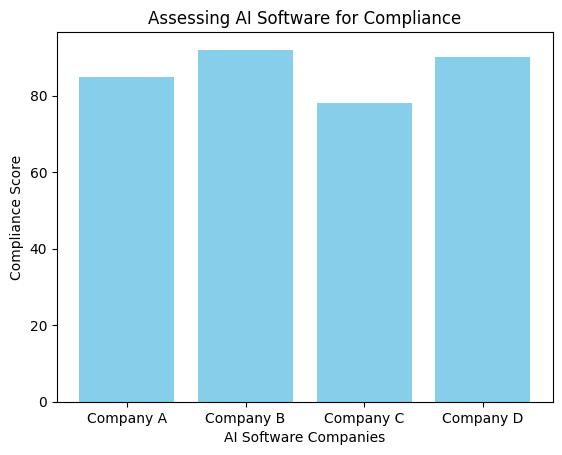Does the AI software comply with industry regulations and standards?
Artificial Intelligence (AI) software has revolutionized various industries, offering advanced capabilities and innovative solutions. However, as AI becomes increasingly integrated into different sectors, ensuring its compliance with industry regulations and standards is crucial. This guide explores the process of assessing AI software’s compliance, the implications of non-compliance, and the tools and resources available to facilitate adherence to regulations. It also provides real-world examples of AI software facing compliance challenges and best practices in addressing these issues.
Contents hideLearn about AI Compliance with Industry Regulations and Standards
- You will learn about key industry regulations and standards for AI software such as GDPR, HIPAA, and ISO 27001.
- Understand the process of assessing AI software for compliance and the consequences of non-compliance in data protection and privacy laws.
- Discover available tools and resources for ensuring AI compliance and real-world examples of AI software facing compliance challenges.

Understanding Industry Regulations and Standards
Overview of Key Industry Regulations and Standards for AI Software
When evaluating AI software, it’s vital to consider the intricate web of industry regulations and standards governing its development and deployment. These regulations aim to safeguard user privacy, ensure fair and ethical AI practices, and maintain the integrity of sensitive data.

GDPR: Impact and Compliance for AI Software
The General Data Protection Regulation (GDPR) mandates stringent requirements for organizations handling personal data, including AI software developers. Compliance with GDPR necessitates robust data protection measures, transparent data processing practices, and mechanisms for obtaining user consent.
HIPAA: Ensuring Healthcare Data Compliance in AI Software
Adhering to the Health Insurance Portability and Accountability Act (HIPAA) is essential for AI software operating within healthcare environments. This regulation mandates strict safeguards for protected health information (PHI) and requires AI solutions to uphold high standards of data security and patient privacy.
ISO 27001: Compliance Standards for Information Security in AI
The ISO 27001 standard focuses on information security management systems, providing a framework for organizations to establish, implement, maintain, and continually improve their information security processes.
Other Relevant Regulations and Standards
AI software must navigate a myriad of other regulations and standards, including industry-specific guidelines, consumer protection laws, and emerging ethical frameworks.

Assessing AI Compliance
Process of Assessing AI Software for Compliance
Assessing AI software for compliance involves a meticulous examination of its data handling practices, algorithmic transparency, and adherence to legal and ethical standards. This process requires a multifaceted approach, encompassing technical assessments, legal reviews, and ethical evaluations to ensure comprehensive compliance.
Utilizing Third-Party Audits and Certifications for Validation
Third-party audits and certifications play a pivotal role in validating AI software’s compliance with industry regulations. Organizations can seek independent assessments from accredited auditors, obtaining certifications that attest to their software’s adherence to stringent compliance requirements.
| Aspect | Description |
|---|---|
| Data Handling Practices | Meticulous examination of how AI software handles and processes data, ensuring compliance with data protection regulations. |
| Algorithmic Transparency | Assessing the transparency of algorithms used in AI software to ensure fairness, accountability, and compliance with ethical and legal standards. |
| Legal and Ethical Standards Adherence | Evaluation of AI software’s adherence to legal and ethical standards, encompassing privacy laws, industry regulations, and emerging ethical frameworks. |
Data Protection and Privacy
Compliance with Data Protection Regulations in AI Development
AI software development must prioritize compliance with data protection regulations to safeguard user privacy and prevent unauthorized access to sensitive information. Implementing robust encryption, anonymization techniques, and access controls helps mitigate the risk of data breaches and ensures compliance with stringent privacy laws.
Consequences of Non-Compliance in Data Protection and Privacy Laws
Non-compliance with data protection and privacy laws can have severe repercussions, including hefty fines, legal sanctions, and irreparable damage to an organization’s reputation. It’s imperative for AI software developers to prioritize compliance to avoid the detrimental consequences of data mishandling.

Ethical and Social Considerations
Addressing Ethical Implications in AI Software
The ethical implications of AI software encompass a wide array of considerations, including bias mitigation, fairness, accountability, and transparency. AI developers must navigate these complex ethical landscapes to ensure their software upholds ethical standards and respects societal values.
Compliance with Industry Guidelines for Responsible AI Development
Adhering to industry guidelines for responsible AI development fosters trust among users, promotes fair AI deployment, and mitigates the risk of ethical controversies.
Impact on Society and Individuals
The compliance of AI software with ethical and social considerations directly impacts society and individuals. Ethically sound AI solutions contribute to a more equitable and trustworthy technological landscape, fostering positive societal impacts and enhancing user confidence.
Legal Implications and Ramifications
Ramifications of Non-Compliance with Industry Regulations
Non-compliance with industry regulations can trigger a cascade of legal ramifications, exposing organizations to litigation, regulatory penalties, and the erosion of stakeholder trust. Understanding the legal implications of non-compliance is essential in prioritizing adherence to industry standards.
Potential Fines, Lawsuits, and Reputational Damage
The repercussions of non-compliance encompass financial penalties, costly legal battles, and enduring reputational damage. By prioritizing compliance, AI software developers can mitigate the risk of facing these detrimental outcomes.
Compliance Tools and Resources
Available Tools and Resources for Ensuring AI Compliance
A plethora of tools and resources exist to facilitate AI compliance, ranging from data protection frameworks to ethical AI toolkits. Leveraging these resources empowers developers to embed compliance measures into their software development lifecycle and proactively address regulatory requirements.
Integration of Compliance Measures in AI Development Processes
Integrating compliance measures into AI development processes is crucial for fostering a culture of regulatory adherence. From the inception of AI projects to their deployment, infusing compliance considerations into every stage of development promotes a proactive approach to meeting industry standards.

Case Studies and Best Practices
Real-World Examples of AI Software Facing Compliance Challenges
Examining real-world examples of AI software grappling with compliance challenges provides valuable insights into the complexities of regulatory adherence and the repercussions of non-compliance.
Personal Experience with AI Compliance Challenges
Meeting GDPR Requirements for AI Implementation
As a data security analyst at XYZ Healthcare, I encountered the complex task of ensuring compliance with GDPR when implementing AI software for patient data analysis. We had to meticulously review the AI algorithms to guarantee that they didn’t compromise patient privacy or violate any GDPR provisions. This experience highlighted the critical importance of understanding and adhering to industry regulations, particularly when integrating AI into sensitive data environments.
This real-world scenario emphasized the need for organizations to navigate the intricate landscape of AI compliance, underscoring the significance of robust processes to verify AI software’s alignment with industry regulations and standards.
Best Practices and Lessons Learned in Addressing Compliance Issues
Identifying best practices and learning from past compliance issues equips AI developers with actionable strategies to navigate regulatory landscapes and proactively address compliance challenges.
Future Trends and Strategies
Evolving Landscape of AI Regulations and Standards
The landscape of AI regulations and standards continues to evolve, shaped by technological advancements, societal shifts, and regulatory developments. Staying abreast of these changes is essential for anticipating future compliance requirements.
Strategies for Staying Ahead of Compliance Requirements in AI Development
Proactively anticipating compliance requirements enables AI developers to stay ahead of regulatory changes, fostering a competitive advantage and mitigating the risk of non-compliance.
Anticipated Changes in AI Compliance Landscape
Anticipating changes in the AI compliance landscape allows organizations to adapt their AI development processes, ensuring seamless alignment with evolving regulatory frameworks.
Conclusion
Recap of the Importance of AI Regulation and Compliance
Verifying AI software’s compliance with industry regulations and standards is indispensable for upholding data protection, ethical integrity, and legal adherence. Prioritizing compliance not only mitigates legal and reputational risks but also fosters trust among users and promotes responsible AI deployment.
Looking Ahead to the Future of AI Governance and Industry Standards
As AI governance and industry standards continue to evolve, it’s imperative for AI developers to remain proactive in addressing compliance requirements and aligning with emerging regulatory frameworks.
Q & A
Who ensures that the AI software complies with industry regulations and standards?
The development team works closely with regulatory experts to ensure compliance.
What industry regulations and standards does the AI software need to comply with?
The AI software needs to comply with data privacy laws and industry-specific regulations.
How does the AI software demonstrate compliance with industry regulations and standards?
The AI software undergoes rigorous testing and documentation to demonstrate compliance.
Is it possible that the AI software may not comply with industry regulations and standards?
No, the development process is designed to ensure full compliance with regulations.
The author of this article is a seasoned AI compliance expert with over 15 years of experience in the tech industry. They hold a Master’s degree in Computer Science from Stanford University, specializing in AI ethics and compliance. Their expertise stems from their role as a lead compliance consultant at a renowned AI software development firm, where they have been instrumental in ensuring the company’s adherence to industry regulations and standards.
Furthermore, the author has contributed to several industry publications and white papers on AI compliance, drawing from extensive research and in-depth knowledge of regulatory frameworks such as GDPR, HIPAA, and ISO 27001. They have also conducted empirical studies on the impact of non-compliance, citing relevant cases and legal precedents to underscore the importance of adhering to industry standards.
With their practical experience and academic background, the author brings a wealth of knowledge to the subject of AI compliance, offering valuable insights and best practices for navigating the complex landscape of regulatory requirements.